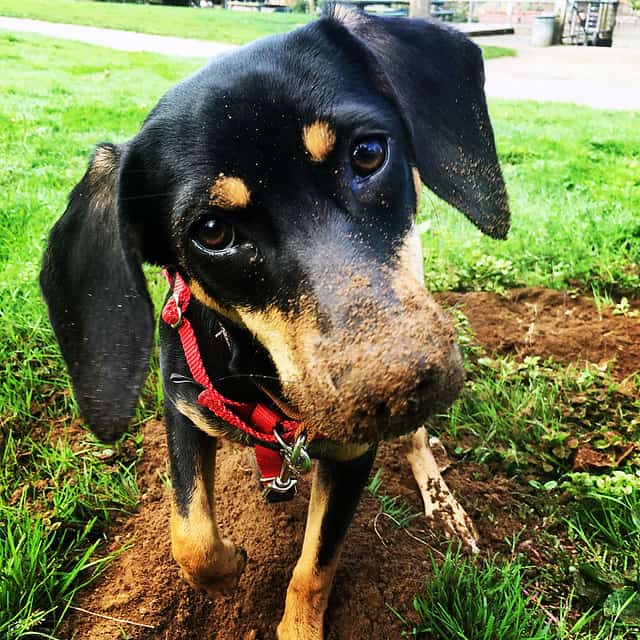Ask the readers: Can you use positive reinforcement to train smart money habits?
Most of the time, I can sit down and write a blog post in an hour or two. Or three. I get an idea, then pick up my laptop, find a quiet spot, and hack out my thoughts.
Some articles, however, take months (or years!) to create. This is one of them.
You see, near the end of our RV trip across the U.S., Kim and I picked up a puppy. While visiting my cousins near Tahlequah, Oklahoma — the end of the Trail of Tears and the setting for Where the Red Fern Grows — we bought one of their hound dog mutts. Naturally, we named her Tahlequah (TOWEL-uh-kwah). From the start, we’ve been in love with her. She’s SO CUTE!
Here she is at three months old, about a week after we got her. She is done with her walk in Fort Collins, Colorado — not moving another inch:

Tally is a hound dog through and through. She is ruled by her nose. She has a strong prey drive. She is fiercely defensive of her territory. We knew from the start that proper training was going to be imperative.
From the day we got her, we started employing positive reinforcement.
What is positive reinforcement? The basic idea is that when somebody (or somepuppy) does something you want, you reward the behavior as soon as possible. This, in turn, tends to encourage the behavior in the future. It’s a like a virtuous cycle.
I love this example of positive reinforcement from The Big Bang Theory:
Anyhow, Kim and I used positive reinforcement with Tahlequah from the beginning.
The moment she did something we wanted, we rewarded it. We praised her and treated her. When she began to understand that certain actions — sitting, for instance, or lying down — led to positive reinforcement, she offered those actions more frequently. As she did, we began to name them. When she sat, we said “sit” and we gave her a tasty treat. Everybody was happy.

A year ago, I snapped this photo of a woman from our dogwalking group (Lara, a practicing psychologist) using positive reinforcement to get a group of dogs to sit. All at the same time.

In June of last year, I got an idea for a blog post: What if we used positive reinforcement to encourage desired money behavior? That’d be awesome!
Over the past eighteen months, I’ve tried to tackle this topic six or seven times (most recently today). But I’m never able to make it work. It’s not that I think it’s a bad idea — I think the idea is great! The real issue is I can’t think of many examples of how to put this into practice. Exactly how would you use positive reinforcement to build smart money habits?
Now and then, I see small examples.
For instance, Kim deposits checks to her USAA account by phone. She snaps a photo, then uploads it to her account. When she does, the USAA app makes a cha-ching noise. “I love that sound!” Kim told me a while back. “It makes me want to deposit more checks.” That, my friends, is positive reinforcement. But it’s only one example.
But when I try to think of other examples, I come up short.
I suppose employer matches to 401(k)s (and other retirement programs) are examples, but they seem to have marginal effect. Other times, the examples of positive reinforcement in the world of personal finance don’t make much sense. A child tax credit that incentivizes having children? Uh, that’s a little weird. Or credit card rewards that encourage users to spend? Hmmm….
So, after eighteen months of trying to write an article about positive reinforcement and personal finance, I’m giving up. Instead, I’m going to turn this around and ask you for examples.
Have you seen examples of positive reinforcement in the world of personal finance? What are they? More to the point, have you applied positive reinforcement in your own life? Have you used it to encourage yourself toward better behavior? Have you used it to encourage your spouse, your children, your extended family?
Postscript: I’m not kidding when I say I’ve tried to write about this six or seven times since June 2016. I have several half-finished articles about positive reinforcement and money gathering dust in Dropbox. The first is from July of last year and it’s 3500 words long…but still not worth publishing.
Become A Money Boss And Join 15,000 Others
Subscribe to the GRS Insider (FREE) and we’ll give you a copy of the Money Boss Manifesto (also FREE)
